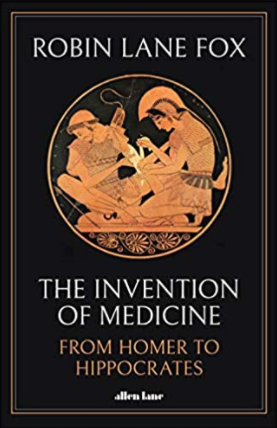
Ancient Greece’s early medicine and healing


Hippocrates is a celebrated worldwide father of medicine and the Hippocratic Oath is admired throughout the medical profession as a founding statement of ethics and ideals. In the fifth century BC, The ancient Greeks even wrote of medicine as a newly discovered craft they had invented.
Robin Lane Fox’s book put Greek invention of medicine in a wider context from the epic poems of Homer to the first doctors known to have been active in the Greek world. He focuses on seven core texts which give the case histories of named individuals showing that books 1 and 3 belong far earlier than previously recognised. Their re-dating has important consequences for the medical awareness of the great Greek dramatists and the historians Herodotus and Thucydides.
This original book opens windows onto many other aspects of the classical world, from women’s medicine to street-life, empire, art, sport, sex, and even botany. He carries readers along an extraordinary journey from Homer’s epics to the grateful heirs of the Greek case histories, first in the Islamic world and then in early modern Europe.
The Invention of Medicine on the battlefield of Troy, where Homer’s “anatomical topography” has long been admired by modern students of the “brachial plexus lesion” (a numbed hand after a blow on the collar bone), the “greater sciatic notch” (a pathway for a spear from buttock to front), and the type of throat wound that allows a dying hero the last word.
Lane Fox’s tale ends in the lesser-known medical training grounds of Thasos, a gold-mining island in the North Aegean sea which, some 500 years after the Trojan war, was home to wealthy patients who paid doctors to study closely their ailments, few from violence, more from an excess of wine, sex and other enjoyments of money.
Thasos is more important than Troy. Lengthy study thereof sick individuals, thoroughly noted in surgeries and at besides by writers of the so-called Hippocratic corpus, turned medicine from vivid description into science. The idea of an earlier “Doctor Homer”, an ancient with a black bag describing liver membranes had obvious appeal to surgeons who sought poetry in their profession’s past.
The plot of the Iliad, the wrath of Achilles, comes from the hero’s reaction to the wounding of the Greek army doctor, Machaon. Epic poets were not concerned with natural causes. Gods did the causing and sometimes the curing too but they did not deal with the mundane.
The earliest medical fees came in around 520BC to a fortunate Greek slave called Democedes from Darius, king of Persia. For healing a damaged foot he received fetters of gold: “forerunners of our golden handcuffs”, they were an atypically regal gift to an inferior, according to Lane Fox.
Apollonius, a traveling healer in around 440BC, sought his rewards from Persian princes in sex until his failure to cure the royal womb earned him two months of torture before a burial alive. Alcmaeon is attached to the reasoning, around 510BC, that sensation and understanding came from the brain, a potentially great advance had it not been reasoned against by Aristotle.
Lane Fox takes us to the gold-rush island of Thasos and the controversy over who was the Hippocrates who got the credit for so many doctors’ work. The most impressive case studies date from around 470BC not long after Homer’s poems were first set in writing, their author was a pioneer of the rational empiricism that made Greece famous, if they are later, then Hippocrates was merely one of a crowd. Readers can enjoy a vivid ride through a part of Greece little visited in either body or mind which includes the most detailed account in Greek history of daily weather the linking of weather to disease, generalisation from samples of urine, blood, and excreta, the 19-day course of a drunken fever the 80-day trial of a woman dying delirious after childbirth, the simultaneous coincidence of the first period with a nosebleed. One of the doctors compares the learning of medicine from predecessors to the cultivation of “what grows in the ground.”
Lane Fox brings together the doctor’s thinking from his terse observations and relates it in a new way to the history of Greek prose and ideas. It fills a dark decade in a new way and carries readers along an extraordinary journey.
The Invention of Medicine: From Homer to Hippocrates by Robin Lane Fox, Allen Lane £25. 432 pages.
